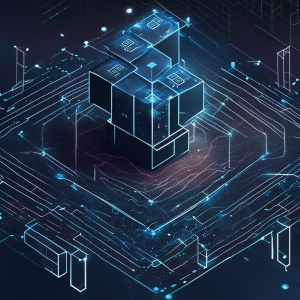Table of Contents:
Introduction to Blockchain and Identity
The world is becoming increasingly digital, and with this shift, the need for secure digital identities is growing. Traditional ways of managing identities are complex and can sometimes be unreliable. This is where Blockchain, the technology underpinning cryptocurrencies, steps in. To appreciate Blockchain's role in digital identity, we must first understand what a Blockchain is and how it operates.
In its simplest form, a Blockchain is a distributed ledger that records transactions across many computers to ensure that the record belongs to the actual person. The essence of this technology is that it allows data to be stored in an immutable, transparent, and secure manner, making it ideal for storing and validating digital identities.
The Best Mining Providers at a Glance
» Infinity HashFrom our perspective, currently the best mining provider on the market. With the community concept, you participate in a mining pool completely managed by professionals. A portion of the earnings are used for expansion and maintenance. We've never seen this solved as cleanly anywhere else.
» Hashing24A well-known and established cloud hosting company. With a good entry point and in a good market phase, a good ROI can also be generated with some patience. Unfortunately, we see the durations as a major drawback.
Now, how does Blockchain affect the world of digital identity? Our traditional way of proving our identity over the internet is deeply flawed. Key identifiers such as our social security or driver's license numbers are prone to theft and misuse. Blockchain offers a solution that empowers individuals to have control over their own digital identities, providing increased security, privacy and ease of use.
Exposing the Problem: Current State of Digital Identity
The digital era has revolutionized many aspects of our lives, but it also brings along its own challenges, and one of them is the security of digital identities. As we increasingly transact online, our identities often get fragmented and stored in many different databases. This scattered approach opens us up to risks of data breaches and identity theft.
Traditional identity proofs like passwords, security questions, and physical IDs such as passports are not fit for the digital age. These methods are vulnerable to hacking, and identity theft incidents are on the rise. In addition, individuals typically do not have control over where their data goes or how it is used, leading to concerns about privacy.
Apart from security and privacy concerns, the current ways of managing digital identities are also quite inefficient. Often, users have to undergo the same verification procedures over and over again for different services. This process is not only annoying for users, but it also comes with high administrative costs for businesses.
Pros and Cons of Blockchain in Digital Identity
| Pros | Cons |
|---|---|
| High level of security | Complex technology |
| Transparency and traceability | Scalability issues |
| Controlled and consent-based sharing | Regulatory challenges |
| Promotes privacy | Adoption takes time |
| Reduces identity theft | Misconceptions about the technology |
Understanding Blockchain: An Overview

The Blockchain is a breakthrough technology that transforms the way we handle data. Its core principle is decentralized and transparent data storage. Unlike traditional databases, where data is stored centrally, Blockchain builds upon the concept of a distributed network where data is stored across a multitude of systems globally. This ensures reliability and mitigates risks associated with centralized data breaches.
Transactions recorded on a Blockchain are grouped into blocks, and each block is linked to the previous block in the chain, hence the name Blockchain. This linked structure ensures data integrity since the information in a block cannot be altered without modifying all subsequent blocks, which is computationally impractical.
Furthermore, a Blockchain operates based on consensus protocols—it requires agreement from several nodes (participating computers) for data verification and addition to the chain. This decentralization safeguards against single points of failure and provides a secure, immutable record of transactions.
The most vital aspect of Blockchain technology is its transparency. All changes to the ledger can be viewed by everyone in the network, facilitating trust and accountability. However, despite its transparency, it secures the privacy of the user's identity, which is a critical aspect when we consider the role of Blockchain in managing digital identities.
How Blockchain can Enhance Digital Identity
Embracing Blockchain for managing digital identities can bring about a radical shift, aiming to eliminate the pain points of the current systems. Adopting a Blockchain-based approach to digital identity has the potential to empower individuals with control over their personal data, enabling them to prove their identity quickly and securely, whenever required.
Using Blockchain for digital identities starts by creating a digital fingerprint for an individual. This fingerprint or hash is a unique cryptographic representation of a user's identifying information. The Blockchain then verifies the individual's identity against this recorded hash whenever needed. It's important to note that actual personal data is not stored on the chain, only the hash. Therefore, without exposing sensitive personal data, Blockchain can confirm an individual's identity.
This method significantly reduces the risk of identity theft as personal information no longer needs to be dotted around various databases. Transactions on the Blockchain are secure, and the record is tamper-proof making the digital identity reliable. At any given moment, a user's digital identity is only accessible using their private key, thereby ensuring privacy.
In summary, the application of Blockchain technology to digital identity offers clear benefits- enhanced security, improved privacy, and a more efficient way to prove identity both online and offline. Moreover, it puts individuals firmly in control of their personal information. Rather than entrusting our precious data to multiple organizations, we can secure it within a system designed with trust and security at its core.
Wouldn't it be easier if your digital identity was as reliable as showing a passport at the airport? Blockchain might be the answer to that. It's an innovative solution that could shape the future of digital identity, bringing us one step closer to a world where identity theft could be a thing of the past.
Real-life Applications of Blockchain in Identity Management

In the real world, blockchain's unique attributes are being harnessed to build more robust systems for managing digital identities. Several initiatives are already underway, demonstrating the practical potential of using blockchain in this area.
Self-Sovereign Identity (SSI) solutions are one of the most popular applications of Blockchain in identity management. SSI allows individuals to maintain and control their identity information throughout their lifetime. Since it uses blockchain, the individual's identity information remains secure and unalterable, boosting trust and privacy. Civic and Sovrin are prominent examples of platforms offering Blockchain-based SSI.
Additionally, financial institutions and governments are exploring blockchain's potential to combat identity fraud. Implementing Blockchain into their systems not only heightens security but also reduces costs associated with identity verification. Estonia is a noteworthy instance, with its e-residency program that uses blockchain technology to offer digital identities to its residents, enabling them to access various public services securely and efficiently.
Moreover, various humanitarian organizations have piloted the use of blockchain in managing identities of refugees. The United Nations' Blockchain-based identity system has helped refugees gain access to essential services without the need for traditional identification documents.
Lastly, the healthcare sector is showing great interest in blockchain technology for securing patient records and managing digital identities. Blockchain-based identity systems can help create a unified, secure health record for each patient, paving the way for personalized care and improved health outcomes.
These applications highlight a clear shift towards a more secure and user-centric approach to managing digital identities, underpinned by the power of Blockchain.
Challenges in Implementing Blockchain-based Digital Identity
While the potential of Blockchain in managing digital identity is immense, its widespread implementation is not without hurdles. One of the major challenges lies in designing a user interface that is friendly to non-technical users. Majority of individuals, particularly in developing nations, lack the technological literacy required to navigate Blockchain systems, creating a barrier to its adoption.
Regulatory and legal issues also provide a significant hurdle. In several jurisdictions, the legal recognition of Blockchain-based identities is uncharted territory. Policy frameworks and legal regulations around digital identity and personal data protection are still coming to terms with this innovative technology.
Additionally, building interoperability across different Blockchain platforms poses a challenge. There are several Blockchain solutions in the market, and a digital identity solution would only be effective if it's universally accepted. Industry players need to collaborate to develop universal standards and interoperability protocols to ensure a seamless cross-blockchain operation.
Lastly, issues around data privacy are a concern. While Blockchain assures users of more control over their data, jurisdictions like the European Union, which has stringent data protection laws under the General Data Protection Regulation (GDPR), brings about the challenge of reconciling the Blockchain's permanent, immutable nature with data erasure rights of individuals.
Conclusion: The Future with Blockchain in Digital Identity

In conclusion, it's clear that the Blockchain has the potential to transform the world of digital identity management. Its inherent attributes of decentralization, immutability and transparency lend themselves well to providing solutions to the current challenges we face with digital identities in terms of security, privacy and efficiency.
This revolutionary technology offers us the promise of a future where digital identities are kept secure, private and under the control of the individual. With the incorporation of Blockchain in digital identity systems, we can move towards a future where identity theft is virtually impossible and time-consuming identity verifications are a thing of the past.
While the implementation of Blockchain-based identity systems may take time and has its own set of challenges, its potential benefits to both individuals and businesses are undeniable. As we continue to make more aspects of our lives digital, the need for secure, reliable identity management will only increase.
The path to realizing this future is not without obstacles but introducing Blockchain into the mix appears to be a significant step in the right direction. The potential is enormous, and we are only at the beginning of this revolutionary journey.
Häufig gestellte Fragen zur Rolle der Blockchain in der digitalen Identität
Was ist Blockchain?
Blockchain ist eine dezentrale und verteilte digitale Aufzeichnung von Transaktionen, die über mehrere Computer verteilt ist, um maximale Sicherheit und Transparenz zu gewährleisten.
Was ist digitale Identität?
Eine digitale Identität ist eine Online- oder Netzwerk-ID, welche spezifische Informationen oder Attribute einer Einzelperson oder Einheit enthält.
Wie hilft Blockchain bei der digitalen Identität?
Blockchain-Technologie kann bei der Beibehaltung der Sicherheit, Privatsphäre und Kontrolle von digitalen Identitätsdaten helfen, indem sie eine dezentrale, unveränderliche Aufzeichnung bietet.
Was sind die Vorteile von Blockchain für die digitale Identität?
Einige der Vorteile können sein: verbesserte Sicherheit, Reduzierung von Identitätsdiebstahl, verbesserte Privatsphäre, Benutzerkontrolle über persönliche Daten und eine effizientere Datenverifizierung.
Gibt es Herausforderungen bei der Nutzung von Blockchain für digitale Identitäten?
Ja, Herausforderungen können sein: Skalierbarkeitsprobleme, regulatorische und rechtliche Aspekte, technische Komplexität und Akzeptanzprobleme.










